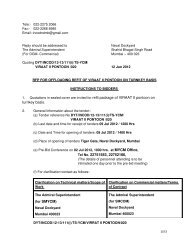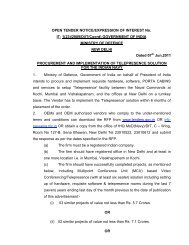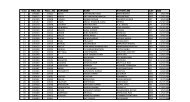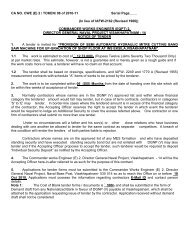deployment of the PLA Navy ships in the - Information Resource ...
deployment of the PLA Navy ships in the - Information Resource ...
deployment of the PLA Navy ships in the - Information Resource ...
You also want an ePaper? Increase the reach of your titles
YUMPU automatically turns print PDFs into web optimized ePapers that Google loves.
FFFFFFFFFFFFFFFFFFF<br />
While we lay so much stress on tra<strong>in</strong><strong>in</strong>g, how many at every stage, <strong>the</strong>n us<strong>in</strong>g this data base, <strong>the</strong> <strong>in</strong>dividual<br />
<strong>of</strong> us understand <strong>the</strong> process <strong>of</strong> learn<strong>in</strong>g?<br />
Some learners have no difficulty learn<strong>in</strong>g us<strong>in</strong>g<br />
only textbooks. O<strong>the</strong>rs need to have hands-on<br />
experience or experiment with <strong>the</strong> subject matter <strong>in</strong><br />
order to understand. Still some learners benefit from<br />
group work and discussions. In my own course, I have<br />
witnessed a few who cannot but hate <strong>the</strong> <strong>in</strong>structor,<br />
and learn <strong>the</strong> content on <strong>the</strong>ir own, and are ever ready<br />
for argu<strong>in</strong>g and prov<strong>in</strong>g <strong>the</strong> <strong>in</strong>structor wrong (Cat A).<br />
There are a few who learn only what <strong>the</strong> <strong>in</strong>structor<br />
speaks and are wary <strong>of</strong> ‘Out <strong>of</strong> syllabus’ questions <strong>in</strong><br />
<strong>the</strong> exam (Cat B). There are always those who can’t<br />
score marks, are averse to read<strong>in</strong>g by <strong>the</strong>mselves but<br />
when given <strong>the</strong> responsibility practically, get <strong>the</strong> job<br />
done <strong>in</strong> <strong>the</strong> best way and can be relied upon (Cat C).<br />
There is noth<strong>in</strong>g wrong with any <strong>of</strong> <strong>the</strong>m, it is just that<br />
<strong>the</strong>ir learn<strong>in</strong>g styles are different. The grades <strong>in</strong> each<br />
phase <strong>of</strong> <strong>the</strong> course such as <strong>the</strong>ory, simulators or OJT<br />
should not be viewed <strong>in</strong> isolation as people would<br />
perform as per <strong>the</strong>ir learn<strong>in</strong>g styles.<br />
Each <strong>in</strong>dividual has a different learn<strong>in</strong>g ability<br />
and style and one should avoid stereotyp<strong>in</strong>g learners.<br />
In fact, learn<strong>in</strong>g styles are similar to personality traits.<br />
While we all share personality traits, we differ<br />
significantly with each o<strong>the</strong>r. The same goes for<br />
learn<strong>in</strong>g styles. Research has shown that <strong>the</strong> more<br />
aware we become <strong>of</strong> our own learn<strong>in</strong>g styles, <strong>the</strong><br />
better we learn.<br />
If one has difficulty learn<strong>in</strong>g a particular subject<br />
or skill, he/she can search for alternative methods for<br />
understand<strong>in</strong>g <strong>the</strong> new content.<br />
However, while every person <strong>in</strong> <strong>the</strong> <strong>Navy</strong><br />
undergoes so much <strong>of</strong> tra<strong>in</strong><strong>in</strong>g, <strong>the</strong>re is seem<strong>in</strong>gly no<br />
effort <strong>in</strong> teach<strong>in</strong>g <strong>the</strong> learners how to learn and <strong>in</strong><br />
assess<strong>in</strong>g <strong>the</strong> learners accord<strong>in</strong>g to <strong>the</strong>ir learn<strong>in</strong>g<br />
styles at <strong>the</strong> schools. We seem to take it for granted<br />
that a standard capsule <strong>of</strong> <strong>the</strong>ory, practicals and OJT<br />
would serve <strong>the</strong> purpose across <strong>the</strong> spectrum <strong>of</strong><br />
learners. We want learners to be 'Cat B' and also 'Cat<br />
C'. If we can identify <strong>the</strong> learn<strong>in</strong>g style <strong>of</strong> each learner<br />
FFFFFFFFF<br />
SEPTEMBER 2010<br />
************<br />
ABOUT THE AUTHOR<br />
NAVAL DESPATCH<br />
can be better tra<strong>in</strong>ed and could be correctly selected<br />
for various tasks. Moreover. When an <strong>in</strong>d<strong>in</strong>dual is made<br />
aware <strong>of</strong> his style <strong>of</strong> learn<strong>in</strong>g, he could make amends<br />
or choose <strong>the</strong> field <strong>of</strong> work accord<strong>in</strong>g to his strengths.<br />
'Cat C' learner is made aware and puts <strong>in</strong> effort to<br />
become Cat B also, he would have best <strong>of</strong> <strong>the</strong> two<br />
worlds.<br />
More than anyth<strong>in</strong>g this data could help <strong>in</strong><br />
grad<strong>in</strong>g <strong>the</strong> learner <strong>in</strong> a particular course. Are we not<br />
surprised sometimes when a student who has scored<br />
high <strong>in</strong> his pr<strong>of</strong>essional school seems to<br />
underperform onboard, or when an average scorer<br />
<strong>in</strong> <strong>the</strong> school performs very well on job. The mismatch<br />
between <strong>the</strong> assessment <strong>of</strong> <strong>the</strong> student <strong>in</strong> <strong>the</strong> school<br />
and his actual performance onboard (which is <strong>the</strong><br />
goal for which he is be<strong>in</strong>g tra<strong>in</strong>ed) is because <strong>the</strong><br />
school does not consider his learn<strong>in</strong>g style while<br />
assess<strong>in</strong>g him. If vary<strong>in</strong>g learn<strong>in</strong>g styles is a reality, why<br />
don’t we cash on it and try to maximise <strong>the</strong> effect <strong>of</strong><br />
learn<strong>in</strong>g process so as to reduce <strong>the</strong> mismatch<br />
between <strong>the</strong> school assessments and onboard<br />
performances. After all, we tra<strong>in</strong> people to optimise<br />
<strong>the</strong> onboard performance and not to identify <strong>the</strong><br />
<strong>in</strong>tellectuals who can memorise figures and write what<br />
<strong>the</strong> evaluator wants.<br />
The best part is that, <strong>the</strong> <strong>Navy</strong> caters for all <strong>the</strong><br />
styles to a large extent but we expect everyone to<br />
perform well <strong>in</strong> all <strong>the</strong> styles <strong>of</strong> learn<strong>in</strong>g. In most <strong>of</strong> <strong>the</strong><br />
courses, we beg<strong>in</strong> with <strong>the</strong>ory, follow it up with<br />
practical sessions / simulators and f<strong>in</strong>ally undertake<br />
<strong>the</strong> OJT. However <strong>the</strong>re is no analysis carried out <strong>the</strong><br />
way one performes <strong>in</strong> different phases and use it for<br />
task<strong>in</strong>g him, <strong>in</strong>stead, <strong>the</strong> marks are just totailed and a<br />
merit list is prepared. In fact, for every course, <strong>the</strong><br />
weightages for each phase <strong>of</strong> tra<strong>in</strong><strong>in</strong>g would need<br />
to be different. In how many cases is <strong>the</strong> appo<strong>in</strong>ter<br />
aware <strong>of</strong> <strong>the</strong> attributes <strong>of</strong> <strong>the</strong> student <strong>of</strong> a course,<br />
which could be derived by this sort <strong>of</strong> analysis? I feel,<br />
we are lack<strong>in</strong>g <strong>in</strong> that f<strong>in</strong>ish<strong>in</strong>g touch where <strong>the</strong> data<br />
is all <strong>the</strong>re and we only need to use it to task <strong>the</strong> right<br />
man for <strong>the</strong> right task, <strong>in</strong>stead <strong>of</strong> forc<strong>in</strong>g all <strong>the</strong><br />
students to ape <strong>the</strong> established stereotype.<br />
Commander Sriram Amur is an alumni <strong>of</strong> Naval Academy. He specialized <strong>in</strong> communication and is a graduate<br />
<strong>of</strong> DSSC. His appo<strong>in</strong>tments <strong>in</strong>clude Instructor and Tra<strong>in</strong><strong>in</strong>g Coord<strong>in</strong>ator at Submar<strong>in</strong>e School, INS Satavahana<br />
and Command<strong>in</strong>g <strong>of</strong>ficer, INS S<strong>in</strong>dhuvijay at Visakhapatnam. He is presently posted as <strong>of</strong>ficer - <strong>in</strong> - charge <strong>of</strong><br />
Submar<strong>in</strong>e School, Visakhapatnam.<br />
FFFFFFFFF 51



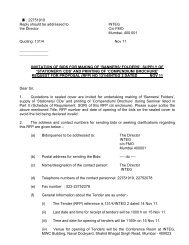
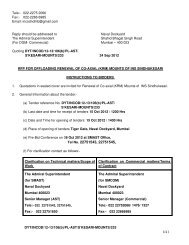
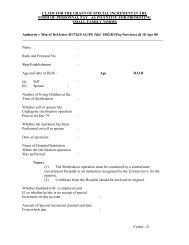
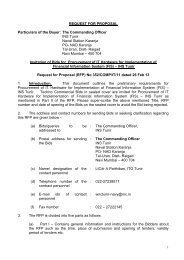
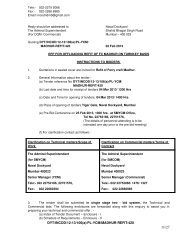
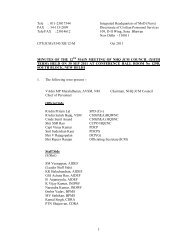

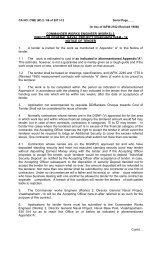
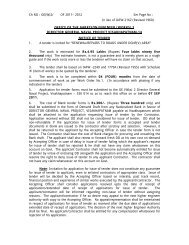
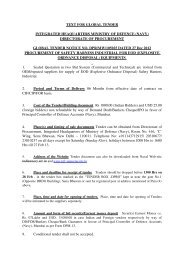
![DGNP[V] - Irfc-nausena.nic.in](https://img.yumpu.com/23509938/1/158x260/dgnpv-irfc-nausenanicin.jpg?quality=85)
